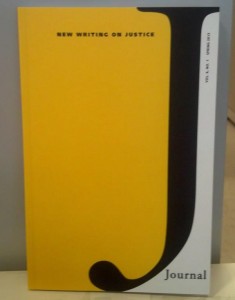Friday Finds for Writers
 Writing-related resources, news, and reflections to read over the weekend. (more…)
Writing-related resources, news, and reflections to read over the weekend. (more…)
 Writing-related resources, news, and reflections to read over the weekend. (more…)
Writing-related resources, news, and reflections to read over the weekend. (more…)

Shabbat shalom.
 My contributor copies of the spring 2013 issue of J Journal: New Writing on Justice arrived last week. (My contribution, “My Life as a Bully,” is an essay describing one of the more shameful episodes from my childhood.)
My contributor copies of the spring 2013 issue of J Journal: New Writing on Justice arrived last week. (My contribution, “My Life as a Bully,” is an essay describing one of the more shameful episodes from my childhood.)
In case you’re not familiar with J Journal, here’s how it is described on its website (which is in the process of being redesigned): “J Journal: New Writing on Justice examines its subject through creative work, directly and tangentially. Housed at CUNY’s John Jay College of Criminal Justice, one of the nation’s premier criminal justice institutions, J Journal’s contributors have included established and new writers, professionals in the law enforcement field, lawyers, professors in the humanities and social sciences, and prison inmates. Unlike other CJ publications, J Journal, which comes out twice a year, is the country’s first to present its analyses of contemporary justice issues through creative, not scholarly work. The short stories, poems, and personal narratives in each volume expand reflection on the question: What is justice?”
Since I’m a J Journal subscriber (and advisory board member) as well as a contributor, I’m awash in spring 2013 issues! And so I’m offering to mail one of my copies to one of you. Please just leave a comment below, and the random number generator will do its job one week from today (please note that I can send only to mailing addresses in the U.S.).
Good luck to everyone who enters the giveaway! And for some other coverage of J Journal, please check out the following:
UPDATE: The Random Number Generator chose our giveaway winner–Commenter #1, Michelle Tackabery! Congratulations, Michelle, and thanks to EVERYONE for the interest in playing along.
Monday brings the weekly batch of no-fee competitions/contests, paying submission calls, and jobs for those of us who write (especially those of us who write fiction, poetry, and creative nonfiction). (more…)
The death of Sen. Frank Lautenberg this week is a loss for his family, for the nation and for the Jewish community. A member of the Senate for nearly three decades, an unapologetic liberal, a gruff legislator who was nonetheless described by his colleagues as a gentleman in an era when civility among partisans is increasingly becoming an anachronism, Sen. Lautenberg — at 89 the oldest member of the Senate — represented a historical memory that is hard to replace.
A product of a poor, immigrant household in Patterson, N.J., he was moved by his own experiences of deprivation to help improve the lot of America’s indigent citizens.
The last member of the Senate who served in the U.S. military during World War II, his political and communal activism was fueled by the sacrifices of a generation that fought for America in the last war that enjoyed national support.
A member of a disappearing generation that remembers a world without a State of Israel, he was inspired by the physical security that Israel offered within its borders to Jews after the Holocaust, and the emotional pride that Israel continues to offer to Jews everywhere.
Although I haven’t commented here on the recent passing of Senator Lautenberg, I have followed the tributes and eulogies. Growing up in the 1980s in New Jersey, I was one of his constituents, and I still recall him visiting our congregation during those years.
One of the tributes that impressed me most this week was one offered by The Jewish Week, which I’ve quoted above. You can find the full text here.